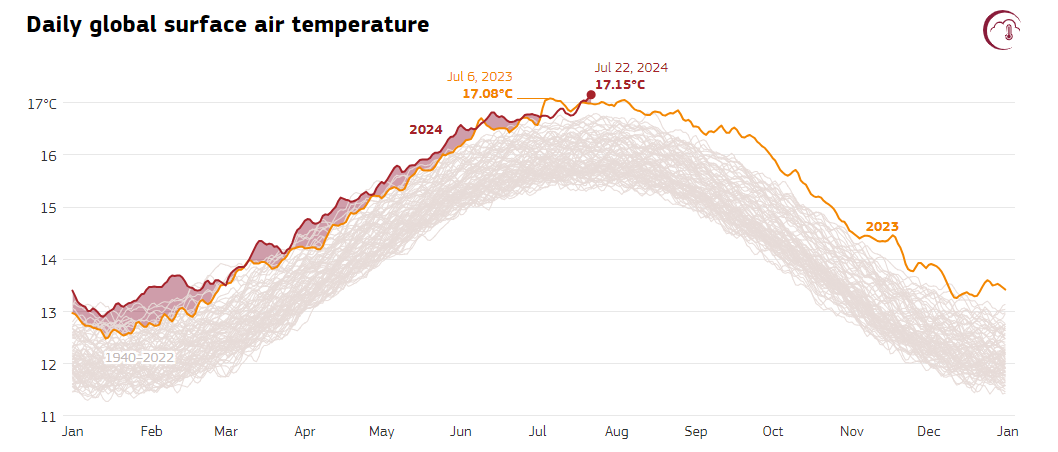According to the Copernicus Climate Change Service (C3S), July 22, 2024 was the hottest day since the ERA5 recording started in 1940. That day, the planet had an average temperature of 17.15°C (62.87°F), breaking the record set on July 21 of 17.09°C (62.76°F), that one only fractionally hotter than the previous record on July 6, 2023.
The measurements are still preliminary, but the difference between the July 22 record and the other measurement is larger than the day-to-day variation in the dataset, so the team is confident that the record will unfortunately hold. The 10 highest annual maximum global average daily temperatures of the last 50 years have all occurred since 2015. This is the climate crisis unfolding as politicians sit on their hands instead of acting in meaningful ways to tackle it.
Curves showing the daily global average temperature from 1940 to today really show how badly things are going…
Data source: ERA5. Image credit: C3S/ECMWF
“On July 21st, C3S recorded a new record for the daily global mean temperature. What is truly staggering is how large the difference is between the temperature of the last 13 months and the previous temperature records. We are now in truly uncharted territory and as the climate keeps warming, we are bound to see new records being broken in future months and years,” C3S Director Carlo Buontempo said in a statement on July 23, before the July 22 measurement was available.
Following the new record on July 22, Buontempo added: “We now have a new record, and its value is sufficiently large to indicate with some confidence that this has exceeded the record set only last year. The event is still ongoing and it is possible the date of the peak may still change, but our data suggest we may see slightly lower temperatures in the next few days”.
Global average temperature reaches its annual peak between late June and early August, matching the summer in the Northern Hemisphere. This is due to the difference in heat capacity between the landmasses and the ocean. There are more landmasses in the Northern Hemisphere so that drives the general shape of global average daily temperatures throughout the year. Since 1940, there has been an upward trend in temperatures, year-on-year. This is due to the increase in greenhouse gas emissions from human activities.
C3S states that is too early to tell if 2024 will beat last year as the hottest year on record, but it has an extremely good chance of doing so. Still, the warm final months of 2023 make this difficult to predict.
Source Link: Sunday’s Hottest Ever Day Record Has Been Broken Already
